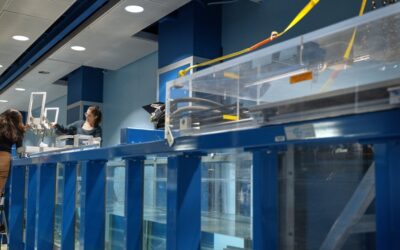Cornell AI News
Want your news listed here? Email us.
Filter by Topic
AI, quantum drive discovery of peptides for microplastic cleanup
A research team led by Cornell has demonstrated how quantum computing and artificial intelligence can be used to design new peptides capable of capturing microplastics that pose serious risks to ecosystems and human health.
How Academe Can Compete in the AI Arms Race by Kavita Bala
We are living in the most consequential decade in artificial intelligence’s history. We don’t know exactly what the future will look like, and we don’t know exactly what innovations it will bring, but we know one thing for certain: AI will be shaped by the people who have access to the most computing power and data.
Mice use their tongues to ‘see’ tactile targets
Cornell scientists have identified the neural pathway mice use to direct the tongue to tactile targets: the superior colliculus, the same brain region that primates – including humans – use to direct their gaze to visual targets. It’s likely that humans use the same neural pathways for touch-guided tongue control.
Pupil size in sleep reveals how memories are sorted and preserved
By studying mice equipped with brain electrodes and tiny eye-tracking cameras, Cornell researchers determined that new memories are being replayed and consolidated when the pupil is contracted during a substage of non-REM sleep.
New device’s radio waves reveal lead contamination in soil
A Cornell Tech-led research group is in the early stages of developing a portable, inexpensive device that uses radio frequency signals and machine learning for another important job: measuring lead contamination levels in soil.
In American fiction, it’s a small world after all
Despite being unbound by space and time, fictional protagonists in American literature travel fewer miles than their nonfiction counterparts, according to a Cornell-led research team that used artificial intelligence to analyze nearly 13,500 books from the last 230 years.
Developing artificial intelligence tools for health care
Reinforcement Learning (RL), an artificial intelligence approach, has the potential to guide physicians in designing sequential treatment strategies for better patient outcomes but requires significant improvements before it can be applied in clinical settings, researchers from Weill Cornell Medicine and Rockefeller University have found.
2030 Project Fast Grant awards support energy systems of the future
Rachee Singh, assistant professor of computer science, and Emaad Manzoor, assistant professor of marketing, will design light-based, optical network fabrics that enable faster communication between GPUs and bypass bottlenecks caused by slower electrical connections.








